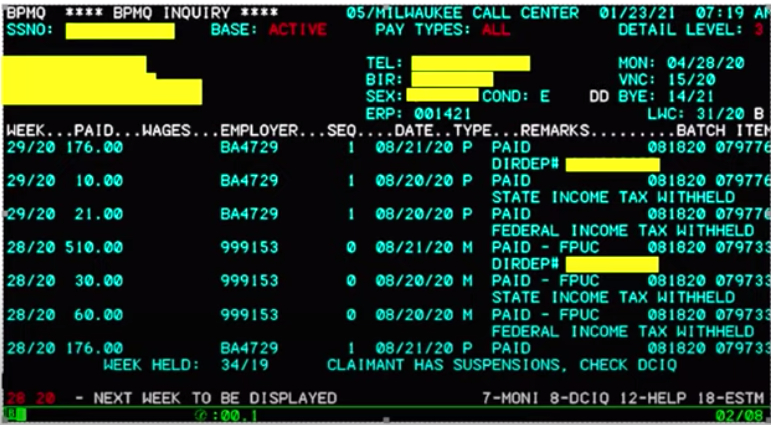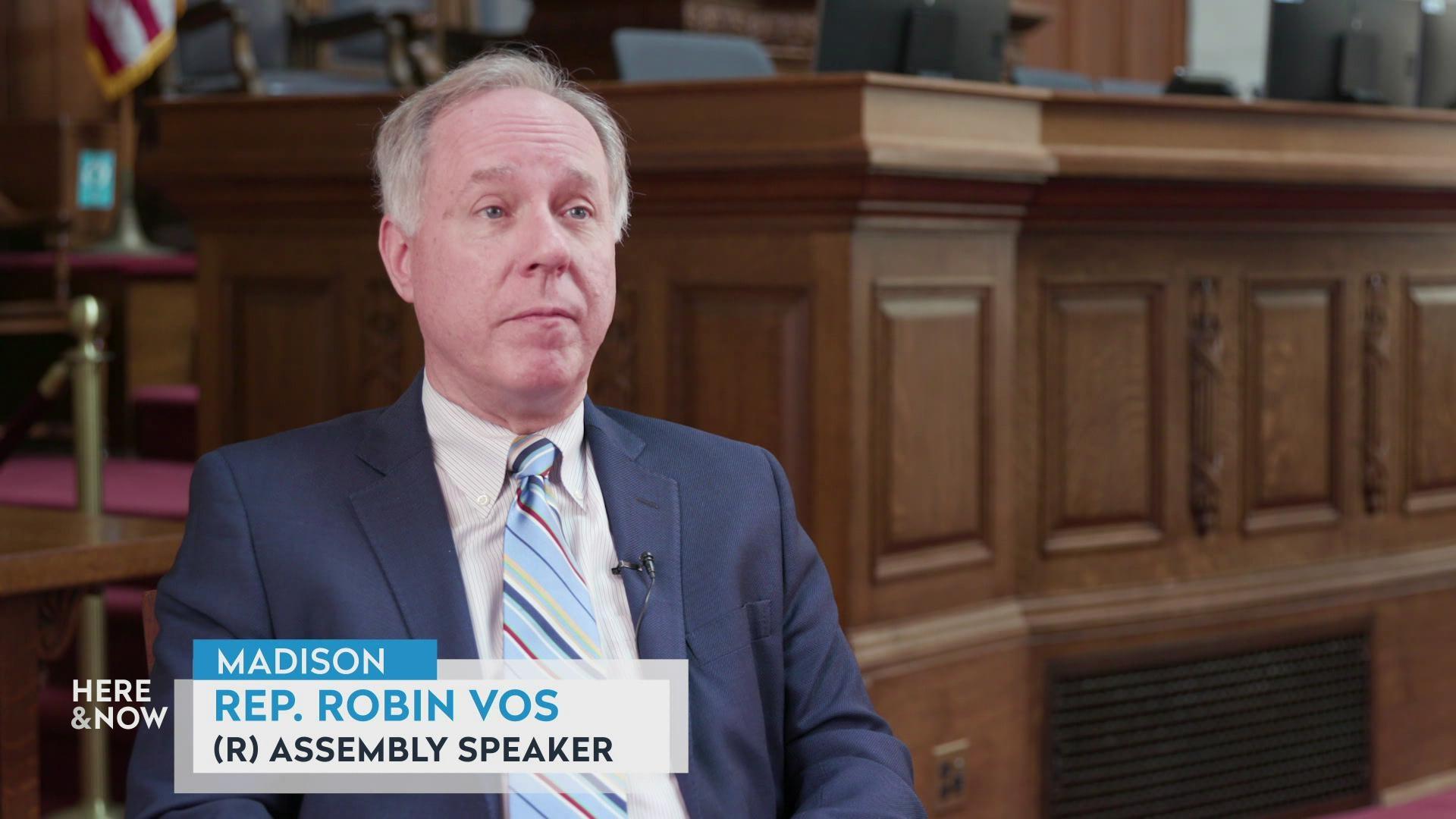‘I Got Nothing Left’: Wisconsin’s Jobless Pushed to Brink as Ideas Swirl for Mending Torn Safety Net
Upgrading outdated technology could help. So could making claims more user-friendly and overcoming partisan paralysis.
Wisconsin Watch
February 22, 2021

A screenshot shows what an adjudicator with the Wisconsin Department of Workforce Development sees when working on an unemployment claim. DWD Secretary-designee Amy Pechacek — who replaced her ousted predecessor in September — said she was in “complete shock” when she discovered how inadequate Wisconsin’s claims processing technology is. (Courtesy: Wisconsin Dept. of Workforce Development)
By Bram Sable-Smith
WPR/Wisconsin Watch
Brandon Cacek filed for unemployment insurance in mid-March last year after losing his substitute teaching job due to the pandemic. He’s still waiting for that crucial aid 11 months later.
“I keep leaving out hope that I’m going to get some kind of assistance through this,” said Cacek, 40, a Marine Corps veteran and father of two in Marinette, Wisconsin. “But the longer this goes on the less hope that lingers.”
Nearly every person who has reviewed Cacek’s case has found no reason to deny him compensation, he said. That includes an administrative law judge who ruled on Dec. 28 that Cacek qualifies for benefits dating to March 5.
But Cacek remains stuck on an obstacle course that has kept thousands of Wisconsinites from quickly receiving compensation after losing work as the Wisconsin Department of Workforce Development wades through a record number of claims during the pandemic.
“I’m seriously not in a position financially for any further delays,” Cacek said. “I’m losing all credibility with my creditors. I got nothing left.”
Democratic Gov. Tony Evers and the GOP-controlled Legislature have spent months blaming each other for the agency’s shortcomings as they stalemate in addressing many of Wisconsin’s challenges. In January, Evers called a special session of the Legislature to overhaul the state’s unemployment system. The Legislature gaveled in as required by law, only to immediately adjourn until Wednesday, when it advanced a bill to start the process of replacing the state’s antiquated claims system.
The Evers administration largely attributes DWD’s shortcomings to its computer system for processing claims — relying on 1970s-era technology that previous administrations never upgraded. Republicans agree that Wisconsin should replace the system, but questions loom about how and when the state will pay for it.
Labor experts say that Wisconsin could take additional steps to more quickly repair its torn safety net. Those include making filing claims more user-friendly by waiving restrictions Republicans enacted last decade to limit access to benefits.
The extra red tape is tripping up legitimate claimants and slowing processing, said Victor Forberger, supervising attorney for the University of Wisconsin’s Unemployment Compensation Appeals Clinic.
“There are now errors popping up all over the place. Those errors now have to be corrected,” Forberger, who has represented Cacek and dozens of other struggling claimants during the pandemic, told a state Senate committee last month. “And that’s leading to more administrative sludge.”
Old Technology ‘A Complete Shock’
DWD Secretary-designee Amy Pechacek said she was in “complete shock” when she discovered how inadequate Wisconsin’s claims processing technology is. Pechacek made those comments in January as her department offered reporters a glimpse of the confusing system.
The department’s IT system requires DWD to program new benefits programs — such as those adopted by Congress — one at a time, adding months to processing. The flood of claims in 2020 required DWD to rehire retired employees who knew COBOL, a 60-year-old programming language.
The system cannot perform multiple tasks at once, said Neeraj Kulkarni, DWD’s chief information officer. The state’s unemployment help center, for example, must stop taking calls by 5:30 p.m. daily so software can begin writing checks to claimants by 6 p.m., Kulkarni said.
DWD says replacing the claims system would cost up to $90 million, and in his two-year budget announced Tuesday, Evers asked the Legislature to earmark $79.5 million for the project.
Instead, Republicans want Evers to first find money himself. The powerful Joint Finance Committee cleared legislation Wednesday that would require DWD “to seek and exhaust any federal funding available to use for the project,” before requesting funds from lawmakers.
The bill needs approval from the Assembly and Senate before landing on Evers’ desk.
Calls For More Fixes
But software upgrades won’t fix everything, as other states have learned. Michigan’s technological overhaul a decade ago resulted in false allegations of fraud against tens of thousands of claimants — leaving many in financial ruin. Agency staffers did not verify whether the automatically flagged claims were actually legitimate. That same system backlogged early in the pandemic.
Rachael Kohl, director of the University of Michigan Law School’s Workers’ Rights Clinic, credited the modernized system with easing the rollout of new benefits programs. But, Kohl cautioned, upgrading technology without paying attention to programming can prove disastrous.
Making claims filing simpler also averts filing mistakes that slow down processing, Kohl said.
Even more helpful for Michigan’s jobless, Kohl said: Gov. Gretchen Whitmer’s series of executive orders which, among other things, temporarily waived a requirement that officials investigate every job separation in the 18 months before a claimant files.
The waiver lasted just months, however, before an October court ruling invalidated Whitmer’s orders. Before the ruling, the shorter investigations meant claims moved quicker, Kohl said.
Whitmer, a Democrat, later forged a deal with the Republican-controlled Legislature to restore some, but not all of the unemployment provisions invalidated by the court ruling.
Forberger, the Madison attorney, testified at a Senate committee hearing last month that Wisconsin should start the years-long project to modernize its claims system, but doing so is “not going to fix anything right now.”
Waiving Walker-Era Restrictions?
The pandemic struck about a decade after Republicans under Gov. Scott Walker toughened rules for accessing unemployment insurance in the name of limiting fraud and saving money.
Wisconsin and other states began to limit access to jobless compensation after a flood of claims during the Great Recession forced them to borrow from the federal government to keep their unemployment trust funds solvent. Under that transformation, states required claimants to clear a series of hurdles to prove they weren’t committing fraud — rather than starting with a presumption of innocence, labor experts told WPR and Wisconsin Watch.
An April New York Times analysis found that all but seven states shrank the percentage of laid off workers receiving benefits between 2007 and 2019. Wisconsin saw about 50% of its jobless receive benefits in 2007; that shrank to just 30% in 2019.
“The (Walker) administration’s goal was to turn unemployment on its head and they succeeded,” Forberger said in an interview. “The whole point now is to deny the claim.”
Disability Changes Delay Payments
Walker’s changes included a 2013 Wisconsin law disqualifying people on federal disability — which currently pays an average of $1,277 per month — from accessing state unemployment compensation when they lose part-time work. Critics say the ban discriminates against people with disabilities.
That’s what first tripped up Cacek when the pandemic cost him his substitute teaching job. Cacek experiences seizures that limit him to part-time work, allowing him to receive federal disability aid since 2017. DWD initially applied the ban not only to regular unemployment insurance, but also to Congress’ pandemic compensation, which Cacek sought. The agency reversed course in July, following an investigation from Wisconsin Watch and WPR. That allowed disability recipients to collect the temporary federal aid, but the agency has slowly processed those applications.
DWD then denied Cacek’s claim, which could be related to confusion over one question on the application, he was told. He is not alone: DWD has taken months to determine many claimants’ eligibility for federal aid.
Cacek then waited four months for DWD to schedule a hearing to appeal his denial, leaving him in limbo with thousands of other Wisconsinites appealing denials.
Without new legislation, Wisconsin’s roughly 175,000 people who receive federal disability assistance will remain ineligible for unemployment insurance once the pandemic ends. Evers’ budget proposes to repeal the restrictive 2013 law.
Other Walker-era restrictions include increased work search requirements for aid recipients. Confusion surrounding those and related requirements often kicks claims into adjudication, which DWD says takes 21 days on average to resolve.
Pandemic Prompts Rule Waivers
Several states have cut their workload by waiving such rules during the pandemic, Forberger said. Changes that could simplify processing in Wisconsin, he said, include eliminating requirements to: register with the Wisconsin Job Service, attend a re-employment services training and declare an “able and available” status for full-time work each week.
The agency could also extend deadlines to file appeals and submit reports, investigate only the most recent job separation of a claimant rather than 18 months of work history and make it easier for businesses to avoid charges to their unemployment accounts due to pandemic-related layoffs, Forberger said.
The Legislature did temporarily waive Wisconsin’s work search rule, and DWD extended the waiver this month. But the state still requires claimants to register with the Wisconsin Job Service and attend training.
Meanwhile, Wisconsin’s one-week wait for benefits, another Walker-era restriction, disqualifies it from collecting a $1.3 million weekly federal reimbursement for unemployment under Congress’ stimulus. State lawmakers waived the waiting period in April, but the waiver expired on Feb. 6. The Legislature included a fresh waiver in legislation that Evers vetoed this month. That wide-ranging bill would have also limited Evers’ emergency powers and given the Legislature control over federal COVID-19 relief funds.
DWD announced Wednesday morning that it had taken “the first step” toward waiving the waiting period through an emergency rules process. And the Republican-led Joint Finance Committee proposed its own temporary waiver — through March 13 — in the legislation advanced Wednesday afternoon.
Evers’ budget calls for expanding eligibility for unemployment insurance and simplifying claims. The proposal would permanently eliminate several restrictions, including: the one-week waiting period, a maximum earnings threshold to qualify for benefits and work search requirements.
But Assembly Speaker Robin Vos, R-Rochester, said his colleagues may “start from scratch” on their own budget.
Cacek said he’s staying busy as he keeps waiting for help. That includes helping his children navigate online middle school and making delivery runs for his local food pantry.
His family is surviving on a collection of small income streams. His wife also receives some disability assistance and earns a few dollars providing child care for the couple’s neighbors. State rental assistance and federal stimulus checks have helped the couple stay in their home; a veterans program called Heat for Heroes has helped with utilities. Cacek also collects empty cans for cash.
“I’m hoping that something with unemployment comes through in the next few months — that allows me to kind of recover and get myself at least back in the black,” he said.
Laurel White of WPR contributed to this report. The story comes from a partnership of Wisconsin Watch and WPR. Bram Sable-Smith is WPR’s Mike Simonson Memorial Investigative Reporting Fellow embedded in the newsroom of Wisconsin Watch (wisconsinwatch.org), which collaborates with WPR, PBS Wisconsin, other news media and the University of Wisconsin-Madison School of Journalism and Mass Communication. All works created, published, posted or disseminated by Wisconsin Watch do not necessarily reflect the views or opinions of UW-Madison or any of its affiliates.
 Passport
Passport











Follow Us